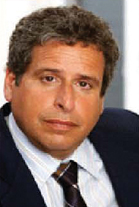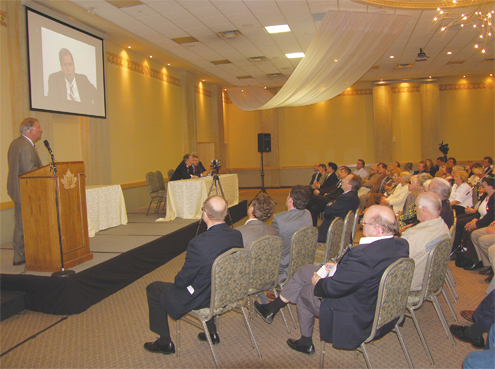Taking on the Kremlin
By
John Pidkowich
International lawyer Robert Amsterdam spoke
about the role of a new organization bringing to the attention of fellow
Canadians some of the issues and immediate threats that face not only the
Ukrainian community but other communities in Canada dealing with a “very new
spectre” of Russia and its foreign policy.
 The Central Eastern European
Commerce Initiative is “a strategic union of the Chambers of Central and
Eastern European countries whose main goal is to establish and cooperatively
promote bilateral trade and commerce relationships between Canada and
the countries it represents”.
The Central Eastern European
Commerce Initiative is “a strategic union of the Chambers of Central and
Eastern European countries whose main goal is to establish and cooperatively
promote bilateral trade and commerce relationships between Canada and
the countries it represents”.
The talk was organized by
the Canada Ukraine Chamber of Commerce, held at UNF Toronto Trident Hall on May
19. A CUCC panel comprised of Master of Ceremonies and VP Lubomyr Kwasnycia,
President Zenon Potichny, VP Bob Onyschuk and Honorary Consul General of
Estonia Laas Leivat were joined by Robert Amsterdam via video-link from Hong
Kong.
Bob Onyschuk introduced
Robert Amsterdam as a lawyer, co-author, political science commentator and
op-ed writer. He is a founding partner of the law firm Amsterdam & Peroff,
specializing in international business law, and he particularly has specialized
in politically complex commercial cases. In 2003, Amsterdam was
retained by the Russian company Yukos to defend former CEO Mikhail
Khodorkovsky, whom the Russian government had charged for alleged tax evasion.
As Mr. Onyschuk recalled,
Mr. Amsterdam spoke to the Chamber last year about he threat he saw coming from
Russia to the countries of the near-abroad – Ukraine, the Baltics, Poland and
Slovakia. He challenged diaspora communities in Canada and
the United States to
unite, to create a Central and Eastern European initiative and to oppose the
pressure of political and economic power levered by Russia
against those countries. He has returned
to speak about the “strategy on how to take on the Kremlin”.
Robert Amsterdam began by
stating that – in taking on the Kremlin - one of the most important things to
understand is that Russia’s
foreign policy does not look after its national interests alone. “Corporate Russia is
impacting all the political activities of the day. Ukraine is
not under this offensive from Russia
merely on a political or ideological basis – it is in many ways and economic
basis. Russia is
attempting to consolidate its economic power and the clans within the Russian
elite are attempting to use that foreign policy to further their predatory and
financial aims,” said Amsterdam.
Amsterdam
drew attention to Article 71 of the Corporate Commercial Code in Russia
which allows state-run enterprises to operate on a completely non-transparent
basis, where government ministers can also chair companies and see no conflict
of interest. The result is what Amsterdam has
coined “pacted bargaining”, stating the idea that in foreign policy
initiatives, “[Russia]
engages as a representative of the different corporate groups as much as it
engages as a state” offering a “virtual cornucopia of economic deals – civilian
nuclear energy, oil and gas.” This “market disruption” is the export of the
very non-transparency Russians suffer to other countries. Canada
faces a unique series of challenges in dealing with Russia. Amsterdam
believes a mobilized community response is answerable for Russia has
suffered losses before European courts and tribunals relating to rule of law.
In the Yukos case, former
shareholders brought arbitration that Russia had
been bound by the Energy Charter and had to comply. Private investors
took on the Russian State and
won. As Amsterdam
stated “This will have dramatic impact for Ukraine
(and all countries of the near-abroad) in bringing a pattern of international
law and arbitration to a more aggressive form of Russian energy policy. The
core of Russian power has been the ability to default to lawlessness and the
ability to leverage economic power for a political result.”
All discussion about the
Great Famine of 1933 has been wiped away from the political map of Ukraine. Ukraine
will no longer have an opportunity to join NATO given the new lease for the
Black Sea Fleet in Crimea,
signed because of the major inducement of reduced gas price. Shockingly, Ukraine
did not obtain from Russia
any guarantees concerning the North Stream and South Stream, gas pipelines that
could constitute a mortal blow to Ukraine’s
ability to recover income through gas transit.
“The community could do a
great deal as demonstrated by the energy charter cases. To the extent that
commercial interests are behind goings on in Russia, we
need to demand Canadian parliamentarians examine the internal rule of law in Russia,”
said Amsterdam. He
added “There is no greater barrier to trade than the opacity of that law”
putting forth the idea that shedding light on the political nature of
prosecutions and the inability of Canadian, Ukrainian and other countries’
firms to get a fair deal with Russia can provide the Ukrainian and other
communities a method of indirect dialogue with those in power in the Kremlin.
Amsterdam
emphasized that the community needs “to provide our legislators with details of
Article 71 allowing Russian state corporations to engage illegally in
anti-competitive practices. He also stated that “Russia in
establishing a gas “OPEC” with Venezuela and
Iran to
raise natural gas prices, making another form of a market disruption - Russia
fights a free market.” Amsterdam
appealed to the community to bring to the attention of our legislators that we
must have free markets – the will of the people, stating “Voting groups will
demand and benchmark the ability of Canada to
insist on fair and equitable treatment of its investors.”
In paraphrasing Andrei
Sakharov: “How a country treats its own citizens depends on how it behaves
outside its own quarters”, Amsterdam
challenged the community to keep Russia’s
behaviour in check by supporting our representatives to have/establish an
agenda:
- Regular monitored meetings
with representatives of the leading parties;
- of legislation that is
being followed;
- on the Artic negotiations;
and
- for Russian companies
buying strategic Canadian assets when the sources of the funds may be
expropriated assets of illegal transactions.
These are possibilities
under Canadian Law and issues the community can be made known through the
Central Eastern European Commerce Initiative by giving it a political mandate.
Amsterdam
stressed the need for this organization to find a voice, showing “that we
understand the threat when Vladimir Putin talks of merging the [Ukrainian and
Russian] gas industry, that we understand the ongoing prosecution and uses of
judges and prosecutors as political instruments, as seen sadly in Ukraine
with the Tymoshenko case.”
By giving our voices to this
initiative, not only are we empowered to bring Russia to
account, but its call can “awaken fellow Canadian citizens to the dramatic cost
of the neglect of the near-abroad in Canadian and American foreign policy,”
concluded Amsterdam.
PHOTOS
1 - Robert Amsterdam
2 - In déjà vu, Robert
Amsterdam by video-link challenges Community with new initiative
 The Central Eastern European
Commerce Initiative is “a strategic union of the Chambers of Central and
Eastern European countries whose main goal is to establish and cooperatively
promote bilateral trade and commerce relationships between
The Central Eastern European
Commerce Initiative is “a strategic union of the Chambers of Central and
Eastern European countries whose main goal is to establish and cooperatively
promote bilateral trade and commerce relationships between  The Central Eastern European
Commerce Initiative is “a strategic union of the Chambers of Central and
Eastern European countries whose main goal is to establish and cooperatively
promote bilateral trade and commerce relationships between
The Central Eastern European
Commerce Initiative is “a strategic union of the Chambers of Central and
Eastern European countries whose main goal is to establish and cooperatively
promote bilateral trade and commerce relationships between 